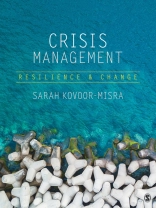Modern organizational crises are complex, diverse, and frequent. Ineffective crisis management can result in catastrophic loss.
Crisis Management: Resilience and Change introduces students to best practices for preventing, containing, and learning from crises in our global, media-driven society. While covering the strengths of existing works on crisis management, such as systems, leadership, communication, and stakeholder perspective, this innovative new text goes beyond to include global, ethical, change, and emotional aspects of crisis communication. Using her proven transformative crisis management framework, Sarah Kovoor-Misra illustrates how organizations of all sizes can be adaptable, proactive, resilient, and ethical in the face of calamity.
Зміст
Introduction
Acknowledgments
About the Author
PART I. FOUNDATION: UNDERSTANDING THE BASICS
Chapter 1. The Nature of Organizational Crises: Understanding Its Structure
What Are the Attributes of a Crisis?
What Are the Causes of Crises?
What Are the Consequences of a Crisis?
What Are the Forms and Types of Crises?
What Are the Phases of a Crisis?
Conclusion
Chapter 2. Organizational Crises as Change
Why Is a Crisis a Change for Organizations?
How Can Organizational Decline Cause Crises?
How Can Organizational Growth Cause Crises?
How Do Crisis Situations Differ From Other Forms of Change?
What Are the Implications for Crisis Management?
Conclusion
Chapter 3. Transformative Crisis Management: An Overview
What Does it Mean to be Transformative?
What Are Some Benefits of a TCM Approach?
What Are the Intellectual Roots of a TCM Approach?
What Are the Phases of Transformative Crisis Management?
What Are Some Critical Processes that Foster TCM?
What Are Some Key Differences Between a Nontransformative Crisis Management and a TCM Approach?
Conclusion
PART II. CRISIS PREPAREDNESS: BUILDING RESOURCES
Chapter 4. Transformative Leaders
How Are Leaders a Resource during TCM?
What Is a Transformative Mind-Set?
What Are Some Important Transformative Values?
What Are Some Important Leadership Traits?
What Are Some Important Leadership Abilities?
What Are Some Important Sources of Power?
How Can Leadership Capacity for TCM be Built?
Conclusion
Chapter 5. Transformative Individuals
How Are Individuals a Resource during TCM?
What Mind-Sets and Values Are Important?
What Are Some Important Personality Traits?
What Are Some Important Abilities?
How Can Organizations Support Transformative Individuals?
Conclusion
Chapter 6. Organizational Culture, Identity, and Character
What Are Organizational Culture, Identity, and Character?
How Are Organizational Culture, Identity, and Character Resources During TCM?
How Can a Transformative Organizational Culture, Identity, and Character be Built?
Conclusion
Chapter 7. Positive Stakeholder Relationships and Adaptable Infrastructure
Positive Stakeholder Relationships
Adaptable Infrastructure as a Resource during Crisis Management
Concluding Crisis Preparedness
PART III. UNDER PRESSURE: Crisis Containment, Recovery and Growth
Chapter 8. Crisis Containment: Managing Crises in Positive Ways
Why Is Containing a Crisis Challenging?
What Is Effective Crisis Containment?
What Are the Stages of Crisis Containment?
How Can Leaders Effectively Contain a Crisis?
Conclusion
Chapter 9. Postcrisis Recovery: Addressing Damage, Deriving Positive Outcomes
What Are Some Areas of Damage that May Need to be Addressed?
What Are Some Positive Outcomes that can be Attained?
How Can Leaders Repair Operational and Physical Damage?
How Can Psychosocial Damage Be Healed During Recovery?
How Can Leaders Effectively Facilitate Postcrisis Recovery?
Conclusion
Chapter 10. Postcrisis Growth: Fixing, Rebuilding, Renewing
What Is Postcrisis Growth?
How Can Leaders Facilitate Learning During Postcrisis Growth?
How Can Leaders Fix Problems and Rebuild Resources During Postcrisis Growth?
How Can Leaders Foster Renewal and Vitality During Postcrisis Growth?
What Steps Can Leaders Take to Facilitate Postcrisis Growth?
Conclusion
Organizational Postcrisis Growth Assessment
Index
Про автора
Dr. Sarah Kovoor-Misra is an Associate Professor of Management at the University of Colorado Denver. Since 1989, she has been studying and researching issues pertaining to organizational crises and organizational change. She has published numerous articles on crisis management that have focused on issues such as the attributes of a crisis (Kovoor-Misra et al., 2001), the causes of a crisis (Kovoor-Misra, 1999), online crises and crisis management (Kovoor-Misra and Misra, 2007), how organizations should and do prepare for crises (Kovoor-Misra, 1995; Pearson et al., 1997; Kovoor-Misra et al., 2000), barriers to crisis preparedness (Kovoor-Misra, 1996; 2002), learning from a crisis (Kovoor-Misra & Nathan, 2000; 2002), and identity and reputation during a crisis (Fiol & Kovoor-Misra, 1997; Kovoor-Misra, 2007). More recently she has studied the relationships between leaders and followers during a crisis, and the effects of followers’ judgments that their leaders are responsible for creating the crisis situation on their learning, trust, organizational identification, sense of hopelessness, and emotional exhaustion (Kovoor-Misra & Olk in press; Kovoor-Misra & Gopalakrishnan, working paper). She has also studied issues pertaining to identity, identification, trust, and emotional exhaustion during organizational change (Kovoor-Misra & Smith, 2008, 2011), and the similarities and differences between organizational change and organizational crises (Kovoor-Misra, 2007). In addition, for over 20 years, she has taught classes on crisis management, organizational change, leadership, and effective individuals and teams. She has also consulted with leading organizations in the public and private sectors, such as NASA, Dow Chemical, Monsanto, Olin, BASF, and the Los Angeles Department of Power. She has been quoted in the Korn Ferry Institute Briefings on Talent and Leadership, and has been recognized by her peers as a significant contributor to the field of crisis management.












